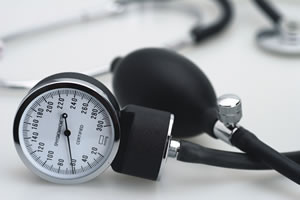
Daily cup of coffee may prevent afib recurrence

Gene-editing therapy lowers harmful blood fats in early study

What is EMDR therapy, and who can it help?

GLP-1 drugs versus bariatric surgery for treating obesity

Trying to lose weight? Be careful not to lose muscle

Two dumbbells, three exercises, and 10 minutes

Easing the emotional burden of IBS

Modify your push-ups to meet your fitness level

What is long QT syndrome?

Stroke survivors may benefit from very low LDL levels
Controlling Your Blood Pressure Archive
Articles
Getting to the heart of kidney disease
Controlling blood pressure and blood sugar will help both your heart and your kidneys.
On the surface, it's difficult to see how coronary artery disease and kidney damage might be related. But on the cellular level, the two conditions often go hand in hand. A closer look reveals the key. Underlying both conditions are two powerful risk factors: high blood pressure and diabetes, each of which damages the heart and kidneys independently.
Adding folate to blood pressure medication reduces stroke
People with high blood pressure could benefit from a B vitamin known as folate if they are not getting enough from their diets, according to a study in The Journal of the American Medical Association (JAMA).
The study included more than 20,000 adults in China with high blood pressure who had never had a stroke or heart attack. Participants who took folate supplements along with a blood pressure medication had fewer strokes over the four-and-one-half-year trial than those who only took the medication.
Should you worry if you have a fainting spell?
Drinking lots of liquids helps prevent fainting and is especially important in warm weather. Image: Thinkstock |
A fainting spell can be inconsequential, or it can signal a serious health issue. It's important to learn why you faint.
Ask the doctor: Why does diabetes raise heart disease risk?
Q. I just got diagnosed with diabetes and my doctor said I am at risk for heart disease. Why?
A. Diabetes is considered to be an extremely strong risk factor for heart disease. One reason is that people with diabetes are also more likely to have other conditions that raise their odds of heart disease, such as obesity, high blood pressure, or elevated LDL cholesterol. Also, those factors seem to have more of a detrimental effect on people who have diabetes compared with those who don't.
Lowering blood pressure: How low should you go?
Blood pressure that is Image: Thinkstock |
The dangers of hypertension are well documented, but low blood pressure levels can cause problems, too.
Adding a diuretic to your blood pressure drug
Diuretics can augment the blood pressure-lowering effects of other drugs, such as ACE inhibitors. Image: Thinkstock |
It may boost the effect of your current medication.
People with high blood pressure need this B vitamin
It appears that people with high blood pressure who take folate along with the blood pressure medicine enalapril (Vasotec) may be less likely to have a stroke than people who take enalapril alone.
Trouble falling asleep linked to high blood pressure
High blood pressure is one of the many health risks associated with not getting enough sleep, which is often caused by insomnia, or difficulty falling or staying asleep. Although often considered a nighttime problem, some people with insomnia may be in a state of "hyperarousal" that also makes it hard for them to nod off during the day. Now, new research suggests that people with chronic insomnia who also have trouble napping face a higher risk of high blood pressure.
The study, in the March 2015 issue of Hypertension, included more than 200 people with chronic insomnia (defined as insomnia that lasts more than six months) and almost 100 normal sleepers. All underwent daytime nap tests, which measures how quickly a person falls asleep in a quiet environment during the day. People with chronic insomnia who took longer than 14 minutes to fall asleep during the nap studies had three times the risk of high blood pressure compared with normal sleepers, the researchers found. Treatments such as medications and biofeedback to help dampen hyperarousal may be best for people with this type of insomnia, they suggest, although more research is needed.
Lower stress, lower your blood pressure
You can't see your blood pressure or feel it, so you may wonder why this simple reading is so important. The answer is that when blood pressure is high, your heart is working overtime to pump blood through your body. This extra work can result in a weaker heart muscle and potential organ damage down the road. Your arteries also suffer when your blood pressure is high. The relentless pounding of the blood against the arterial walls causes them to become hard and narrow, potentially setting you up for stroke, kidney failure, and cardiovascular disease.
A healthy lifestyle — not smoking, losing excess weight, eating nutritious foods, and exercising regularly — is the cornerstone for preventing and treating hypertension.
Ask the doctor: Dizziness from blood pressure medications?
Q. I take several medicines to get my blood pressure under control, and they seem to do the job. However, I get dizzy at times. Is there anything I can do, other than stopping my medications?
A. Many people occasionally feel dizzy if they stand up too quickly, and the older you get, the more likely this will happen. When you're lying down or sitting, less blood pressure is needed to send sufficient blood to the brain. But as you stand, the pressure must rise to deliver adequate amounts. If that doesn't happen fast enough, your brain can't function as well as it should, and you feel dizzy. Moving from a lying or seated position to a standing position more slowly usually helps if this is the underlying reason.

Daily cup of coffee may prevent afib recurrence

Gene-editing therapy lowers harmful blood fats in early study

What is EMDR therapy, and who can it help?

GLP-1 drugs versus bariatric surgery for treating obesity

Trying to lose weight? Be careful not to lose muscle

Two dumbbells, three exercises, and 10 minutes

Easing the emotional burden of IBS

Modify your push-ups to meet your fitness level

What is long QT syndrome?

Stroke survivors may benefit from very low LDL levels
Free Healthbeat Signup
Get the latest in health news delivered to your inbox!
Sign Up









